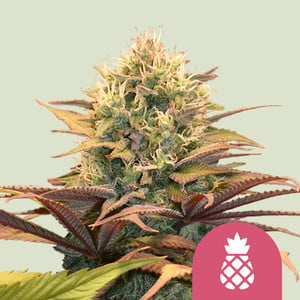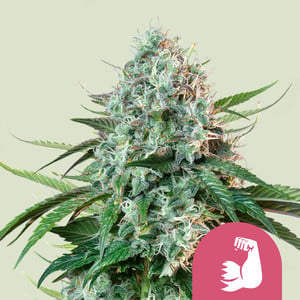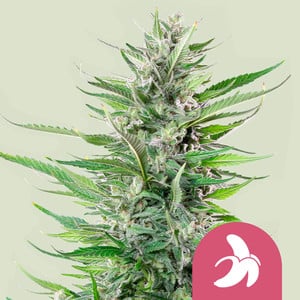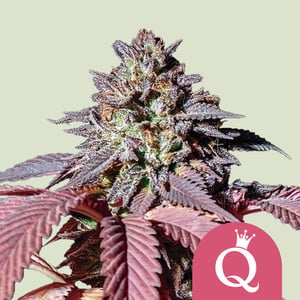What Is Kush Cannabis: Discover the RQS Collection

Kush cannabis is renowned by weed growers and smokers across the world. But where exactly do Kush strains come from? And what impact have they had on the world of weed at large? After discovering the answers to these questions below, you’ll become familiar with our extensive Kush collection. You’ll encounter photoperiod, autoflowering, and high-CBD strains, with concise growing journals for each variety.
Contents:
What Is Kush Cannabis?
Kush is a variety of cannabis that stems from the Hindu Kush mountains. After procuring landrace genetics from this region, breeders have used Kush as breeding stock to create many hybrid strains that fall under the overarching Kush umbrella.
While each strain varies in appearance, effects, and aroma to a degree, these varieties all share a common thread. Kush cannabis strains typically possess dark green colas, sometimes with hues of purple, and the buds are dense and compact. Featuring mostly indica genetics, many Kush hybrids are stout and exhibit broad fan leaves with thick leaflets.
From its origins in an isolated corner of the planet, Kush has gone on to dominate the cannabis industry. These strains have had a profound impact on cannabis culture as a whole, and remain as popular as ever.
The Origins of Kush Genetics
Kush genetics emerged from the namesake mountain range. The Hindu Kush spans from Afghanistan in the west, through Pakistan and Northern India, across southern China and northern Bhutan, and southward into Myanmar. Cannabis as a species is believed to originate in Central Asia and the Himalayan foothills, placing Kush genetics in close proximity to the geographical birthplace of the plant.
Over time, agricultural interaction with cannabis gave rise to distinct landraces as farmers selected for certain traits, including resin production and yield. While cannabis has a long history of use around the Hindu Kush region, strain hunters eventually brought Kush genetics and other landraces back to the West, where they formed the basis of many modern strains, including those belonging to the storied Kush lineage.


The Impact of Kush Varieties on Cannabis Culture
Since Kush first found its way into the hands of commercial Western breeders, it has helped to morph the cannabis industry into what it is today. Strains belonging to the Kush lineage have won countless awards and titles. Alongside an impressive persona on the competition circuit, the quality and potency of Kush genetics has also spread through word of mouth, cementing it and its descendants as go-to cultivars for breeders, growers, and smokers alike. Today, when walking into any dispensary or coffeeshop, or browsing any online seed bank, you’re extremely likely to see the name “Kush” as you make your selection.
The Effects of Kush Strains
As a pure indica, Kush has bestowed many hybrids with an indica-dominant genetic profile. However, depending on the other parent strain, some Kush varieties may lean towards the sativa side of the spectrum. With that said, these titles simply refer to the morphology of different subspecies, and aren’t very useful when it comes to pinpointing the effect of each Kush strain.
In truth, Kush’s effects vary widely, largely depending on the specific chemical composition of each cultivar. Indeed, the type of high a Kush strain provides depends chiefly on its cannabinoid content and terpene profile. OG Kush, for instance, possesses high levels of THC, medium levels of CBD, and the terpene myrcene, producing a stoning body high. In contrast, Kush Mints contains high levels of the terpene limonene alongside plenty of THC, and exerts more of an invigorating cognitive effect.
The Flavours and Aromas of Kush Strains
The flavours and aromas of Kush strains can also vary, as different cultivars contain varying levels of aromatic molecules such as terpenes, volatile sulphur compounds, and esters. However, despite some variance, a uniform Kush taste does unite most varieties; think pungent notes of herbs, flowers, grapes, diesel, citrus, and earthiness.
Royal Queen Seeds Kush Strains Collection: Growing Diaries
Now that you’re familiar with the history, effects, flavours, and aromas of Kush weed, we’re going to introduce you to our proprietary collection of Kush genetics. Below, you’ll discover the sheer diversity of Kush cultivars and how to grow each strain with handy and brief growing reports. Let’s get into it!
OG Kush
.jpg)
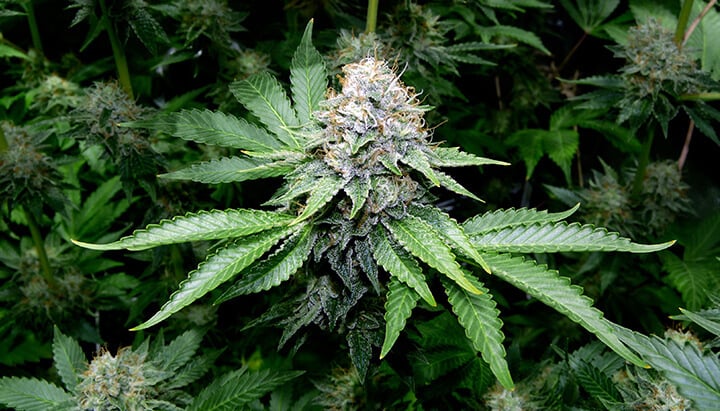
This award-winning hybrid descends from Chemdawg, Lemon Thai, and Pakistani Kush genetics. Start by soaking OG Kush seeds in water for 12 hours before sowing them into cell trays. Once the true leaves surpass the circumference of the cell, transplant into their final pots or outdoor position. Your plants will grow to around 180cm by the end of the vegetative phase, ultimately topping out at 220cm. Defoliate well to keep the canopy aerated. Come harvest time in October, prepare to rake in up to 550g/plant. A THC content of 19%, medium CBD levels, and fruity and piney terpenes catalyse a relaxing yet uplifting high.
OG Kush
|
|
Chemdawg x Lemon Thai x Pakistani Kush |
|
|
425 - 475 gr/m2 |
|
|
90 - 160 cm |
|
|
7 - 9 weeks |
|
|
THC: 19% |
|
|
Sativa 25% Indica 75% |
|
|
500 - 550 gr/plant |
|
|
180 - 220 cm |
|
|
October |
|
|
Calming, Uplifting |
Kali Dog
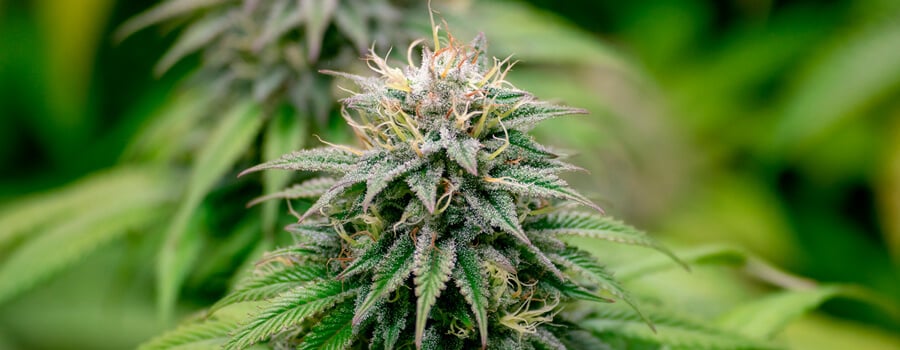
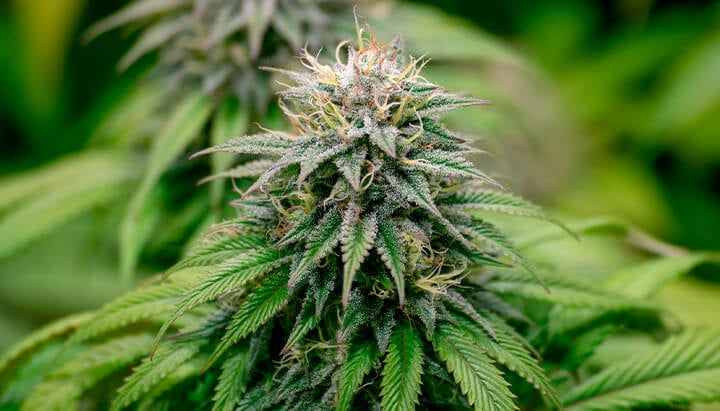
Kali Dog pairs a moderate THC content with a moreish flavour profile. Provided with enough space, outdoor plants grow tall and strong—and churn out jar-filling yields. Start seeds indoors in 1-litre pots. Allow them to reach a height of 10cm and produce several sets of young true leaves before transplanting outdoors into 20-litre pots or large raised beds once all risk of frost has passed. Untrained plants will surge to 160cm by the end of veg, topping out at around 210cm by the time the flowering stretch comes to a close. Take care to defoliate frequently during veg to maintain an open and aerated canopy. During bloom, Kali Dog develops dense, green-purple colas. Prepare to harvest up to 550g/plant in late October. This strain provides punchy tastes of citrus, diesel, herbs, and skunk alongside a clear-headed and uplifting high.
Kali Dog
|
|
Chemdawg x Sour Diesel |
|
|
450 - 500 gr/m2 |
|
|
90 - 160 cm |
|
|
8 - 10 weeks |
|
|
THC: 18% |
|
|
Sativa 55% Indica 45% |
|
|
500 - 550 gr/plant |
|
|
175 - 210 cm |
|
|
Late October |
|
|
Clear, Uplifting |
Bubble Kush
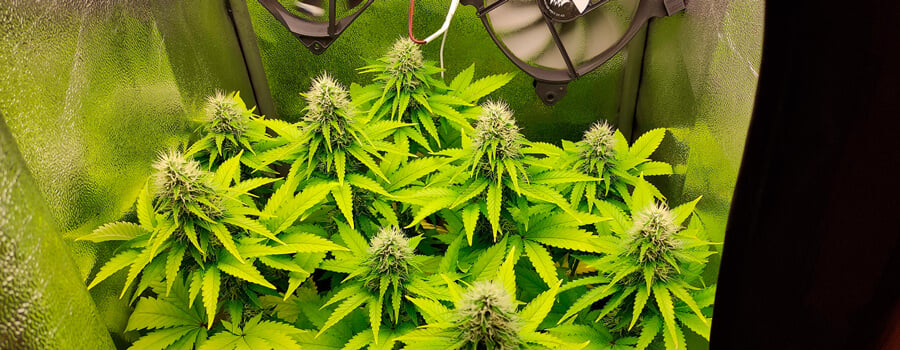
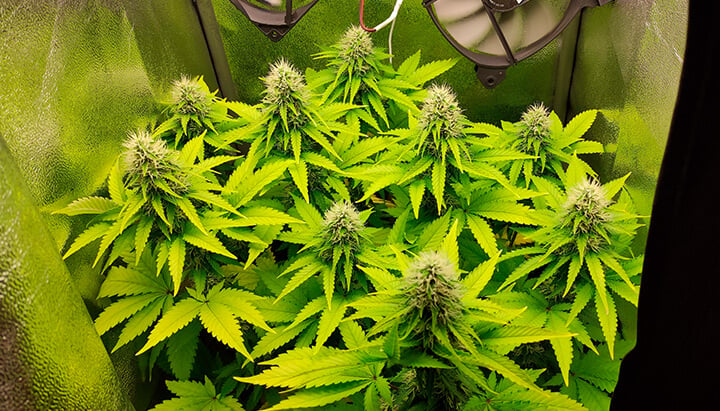
An indica-dominant hybrid, Bubble Kush descends from Bubble Gum and OG Kush genetics. Sow the seeds of this beloved strain into cell trays and keep them well illuminated and irrigated until each seedling reaches a height of 10cm. From here, transplant your seedlings into their final pots/beds outdoors in a sunny position. Apply a mulch of straw or dead leaves in dry regions to lock moisture into the soil. Expect untrained plants to grow to an impressive 200cm under the sun. Flush during the last two weeks of flowering and prepare to pull in up to 650g/plant in late September or early October. Enjoy a physically relaxing high alongside flavours of citrus, earth, fruit, pepper, and pine.
Bubble Kush
|
|
Bubble Gum x O.G. Kush |
|
|
550 - 600 gr/m2 |
|
|
80 - 140 cm |
|
|
8 - 10 weeks |
|
|
THC: 19% |
|
|
Sativa 20% Indica 80% |
|
|
600 - 650 gr/plant |
|
|
160 - 200 cm |
|
|
Late September |
|
|
Clear, Physically Relaxing, Stoned |
Critical Kush
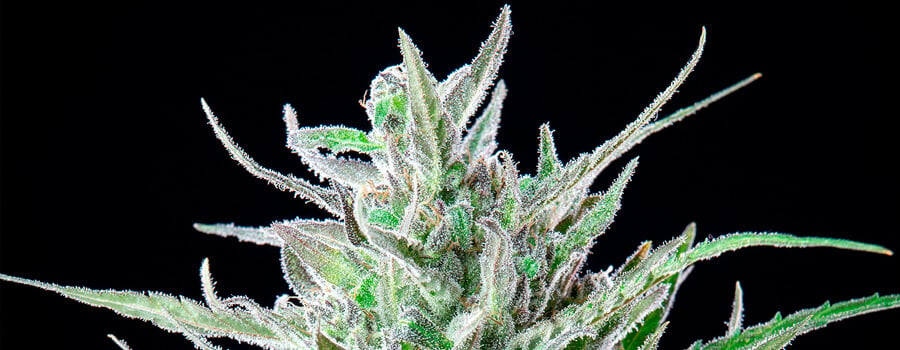
.jpg)
As the progeny of OG Kush and Critical Mass, Critical Kush inherited savoury flavours and a long-lasting high from its parents. Plants will reach their full potential when transplanted into a growing medium amended with mature compost and worm castings, and in a position that receives full sun. This strain quickly develops a leafy canopy and grows to 100cm before transitioning into bloom. Remove lower leaves and thin out the canopy to ensure each bud site receives direct light exposure. Plants will peak at 140cm after stretching and will complete the flowering phase around late September. Prepare to harvest, trim, dry, and cure up to 550g/plant. Critical Kush’s THC content of 20% fuels a stoning high perfect for the evening hours. Flavours of earth, fruit, and pine accompany every hit.
Critical Kush
|
|
Critical x OG Kush |
|
|
500 - 550 gr/m2 |
|
|
60 - 100 cm |
|
|
8 - 10 weeks |
|
|
THC: 20% |
|
|
Sativa 20% Indica 80% |
|
|
500 - 550 gr/plant |
|
|
100 - 140 cm |
|
|
Late September |
|
|
Long Lasting , Physically Relaxing, Powerful |
Pineapple Kush
.jpg)
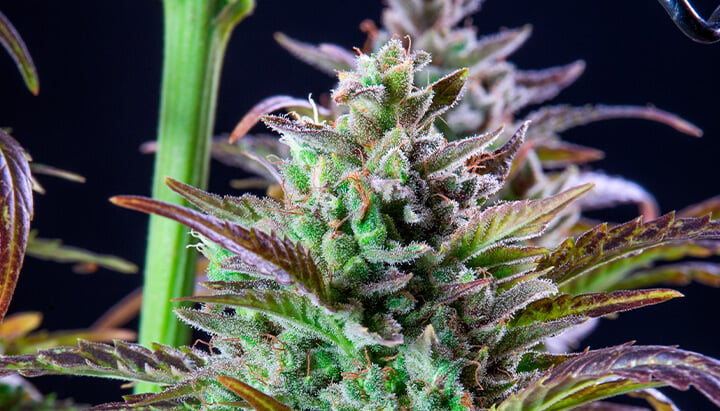
As another classic Kush cultivar, Pineapple Kush stems from a cross between OG Kush and Pineapple. Transplant seedlings into raised beds to allow them to reach their maximum height of 120–150cm. Include companion plants to form a polyculture that will help to stave off pests and diseases. Apply liquid seaweed and fish emulsion throughout veg to keep your plants and soil healthy and productive. Upon transitioning into bloom, Pineapple Kush will stretch to 180cm and develop an extensive canopy packed with resinous colas. Her buds will start to display attractive purple hues towards the end of her flowering phase. Get ready to harvest 500–550g/plant in late September. This strain delivers a pleasing flavour profile consisting of notes of diesel, fruit, pepper, and, of course, pineapple. As these flavours wane, you’ll feel her giggly high take hold.
Pineapple Kush
|
|
Pineapple x O.G. Kush |
|
|
500 - 550 gr/m2 |
|
|
70 - 120 cm |
|
|
8 - 9 weeks |
|
|
THC: 18% |
|
|
Sativa 20% Indica 80% |
|
|
500 - 550 gr/plant |
|
|
120 - 180 cm |
|
|
Late September |
|
|
Calming, Laughter |
Candy Kush Express
The progeny of Sweet Special and OG Kush, Candy Kush Express boasts rapid flowering times and sweet and fruity terpenes. This compact strain fits perfectly in tight spaces and small outdoor gardens. Transplant into a sunny spot and apply LST during the third week of veg to prevent your plants from growing taller than 70cm throughout the entire duration of the growing cycle. If you’d rather leave plants untrained, they’ll peak at 170cm and form a large and bushy canopy. The flowering phase plays out over just 7–9 weeks, culminating in an early September harvest. Apply a good-quality flowering fertiliser to spur growth, but flush during the final two weeks to improve the overall flavour and yield. Expect to pull in up to 500g/plant. A THC content of 18%, fruity flavours, and a stoning high await.
Candy Kush Express (Fast Flowering)
|
|
Sweet Special x O.G. Kush |
|
|
475 - 525 gr/m2 |
|
|
60 - 100 cm |
|
|
7 - 9 weeks |
|
|
THC: 18% |
|
|
Sativa 40% Indica 60% |
|
|
450 - 500 gr/plant |
|
|
100 - 170 cm |
|
|
Early September |
|
|
Physically Relaxing, Stoned |
Buy Candy Kush Express (Fast Flowering)
Special Kush 1
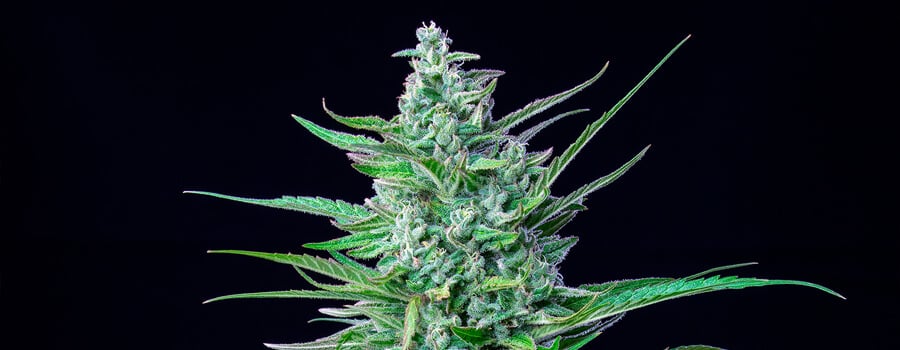
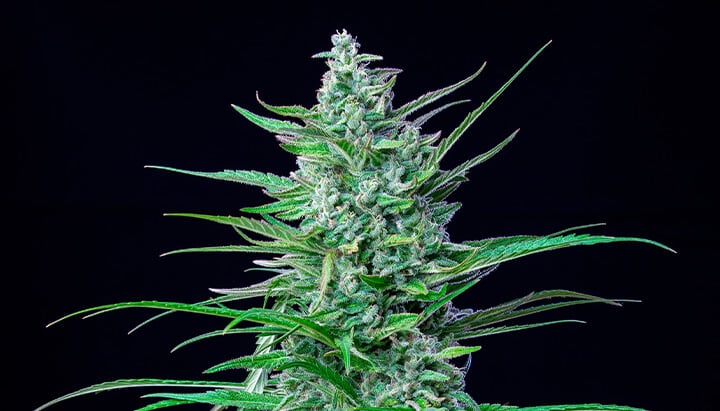
With Special Kush 1, we come to the end of our classic Kush strains. This heavily indica-dominant hybrid possesses Afghan and Kush genetics and grows to great heights outdoors. Start seeds in 1-litre pots and transplant them into a sunny position once they’ve reached a height of 10–15cm. Apply plenty of organic fertiliser during veg to propel growth, and expect untrained plants to reach a height of 200–250cm before bloom. During the flowering stretch, your plants will reach up to 270cm, forming a massive canopy with plenty of bud sites. Make sure you have enough stash jars to handle 550g/plant come harvest in late September. Special Kush 1 pairs a THC content of 17% with earthy and fruity terpenes to exert a happy, heavy, and warming body high.
Special Kush 1
|
|
Afghan x Kush |
|
|
425 - 475 gr/m2 |
|
|
60 - 100 cm |
|
|
7 - 8 weeks |
|
|
THC: 17% |
|
|
Sativa 20% Indica 80% |
|
|
500 - 550 gr/plant |
|
|
200 - 270 cm |
|
|
Late September |
|
|
Heavy, Physically Relaxing, Stoned |
HulkBerry
.jpg)
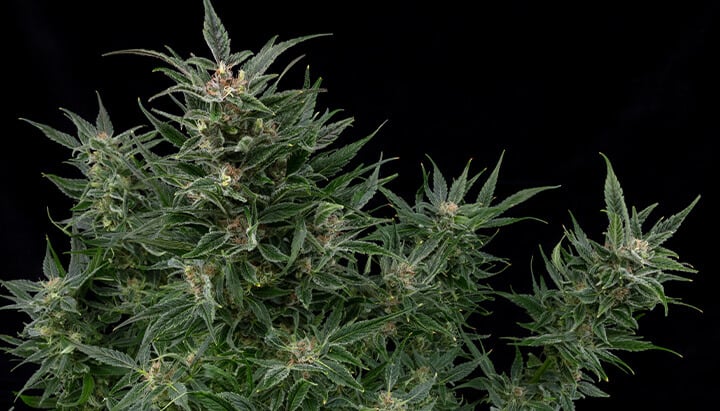
Now, let us introduce you to our new classic Kush strains, starting with HulkBerry. This productive sativa-dominant hybrid stems from OG Kush and Strawberry Diesel. Pop seeds indoors early in the season and transplant them into a sunny spot once the last frost has passed. Place seedlings into large raised beds or directly in the ground to allow their roots to spread. Plants will peak at a height of 200cm after stretching during the early flowering phase. Administer the right amount of potassium and phosphorus and you’ll reap an impressive yield of up to 700g/plant during late September. Her outlandish THC content of 27% means you don’t need to smoke much at all to experience her energetic, uplifting, and clear-headed high.
HulkBerry
|
|
OG Kush x Strawberry Diesel |
|
|
400 - 450 gr/m2 |
|
|
80 - 140 cm |
|
|
9 - 11 weeks |
|
|
THC: 27% |
|
|
Sativa 65% Indica 35% |
|
|
650 - 700 gr/plant |
|
|
160 - 200 cm |
|
|
Late September |
|
|
Clear, Uplifting |
Fat Banana
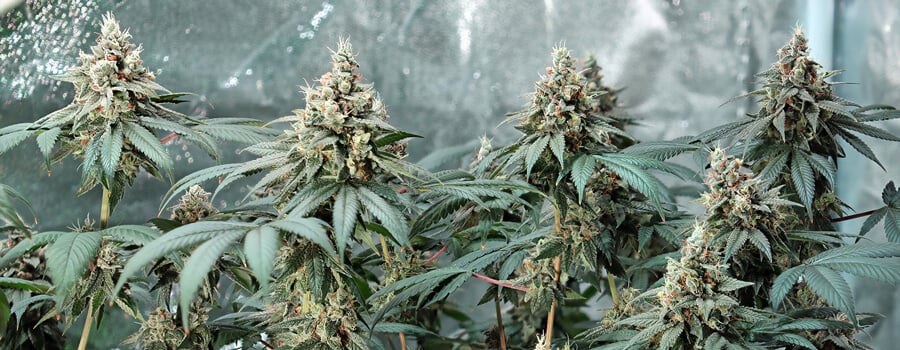
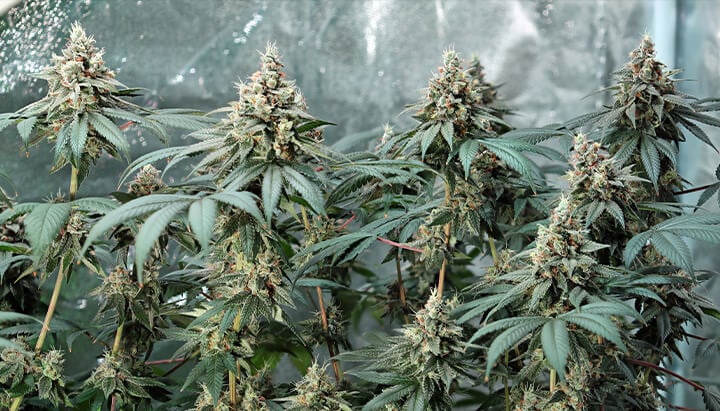
This new classic Kush strain delivers outrageously fruity terpenes and sizeable yields. Formerly known as Chiquita Banana, Fat Banana emerged from the crossing of Banana and OG Kush. Suitable for regions with short growing seasons, this cultivar thrives outdoors in most regions. Start seeds in plugs and transplant seedlings into either 15-litre pots or into raised beds. Expect your plants to grow to 10cm by the end of week two of veg, and to top out at 150–160cm by the end of the vegetative phase. Remove lower leaves and open up the canopy with pruning as plants move into bloom. They’ll stretch to a height of 200cm when given enough room to spread their roots. Come late September, you’ll harvest 450–500g/plant. Enjoy complex flavours of banana, citrus, earth, pepper, and skunk alongside a relaxing and dreamy high.
Fat Banana
|
|
Banana x OG Kush |
|
|
350 - 400 gr/m2 |
|
|
80 - 140 cm |
|
|
8 - 10 weeks |
|
|
THC: 25% |
|
|
Sativa 30% Indica 70% |
|
|
450 - 500 gr/plant |
|
|
170 - 200 cm |
|
|
Late September |
|
|
Calming |
Purple Queen
_1.jpg)
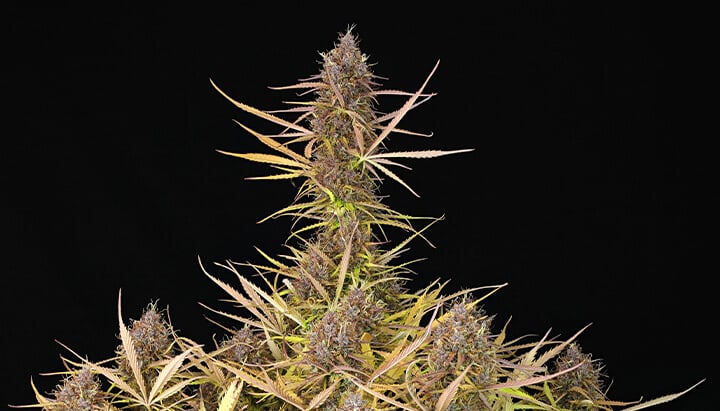
Purple Queen ranks as perhaps the most beautiful Kush strain available, having inherited her good looks from Hindu Kush and Purple Afghani. Start seeds indoors during early spring and transplant them into cell trays. Once the last risk of frost has passed, transplant outdoors into 20-litre pots and aim to keep plants in a greenhouse during heavy rains and adverse weather. Alternatively, transplant them directly into the ground for the biggest plants possible. Your plants will peak at 150–175cm by the end of veg, having developed plenty of branches and nascent bud sites. During bloom, untopped plants send up a large central cola flanked by many smaller buds. Expect plants to turn a deep shade of purple during the end of bloom, and prepare to harvest 650–700g/plant during October. A THC content of 22% and fruity terpenes converge to instil a euphoric effect.
Purple Queen
|
|
Hindu Kush x Purple Afghani |
|
|
450 - 500 gr/m2 |
|
|
80 - 120 cm |
|
|
8 - 9 weeks |
|
|
THC: 22% |
|
|
Sativa 25% Indica 75% |
|
|
650 - 700 gr/plant |
|
|
175 - 210 cm |
|
|
October |
|
|
Calming, Euphoric |
Bubble Kush Auto
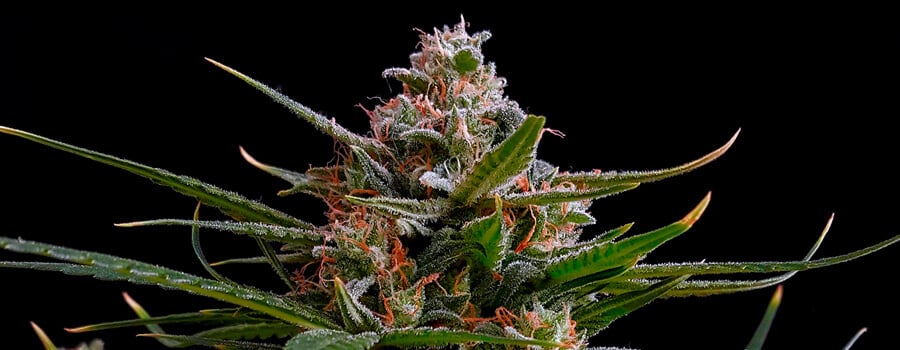
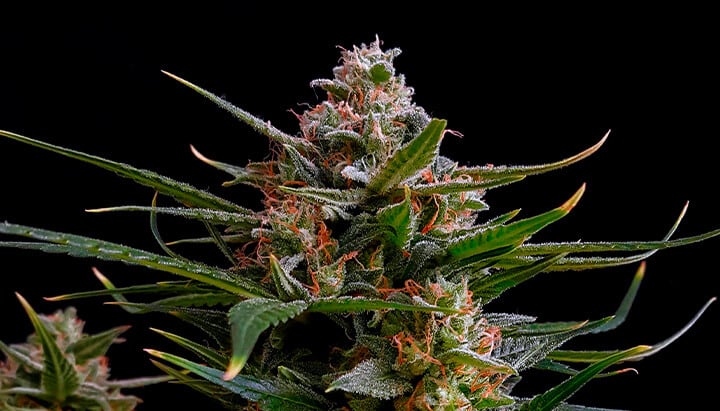
You’ve made it to the autoflowering section of our Kush genetics collection! Let’s kick things off with Bubble Kush Auto. Soak seeds for 12 hours and sow them directly into 11-litre pots filled with good-quality soil and enriched with organic matter. Untrained plants will grow to a size of 100–120cm; thin out their bushy and compact canopy with light defoliation prior to bloom. Bubble Kush Auto stretches to 140cm during flowering and produces a canopy of eye-catching buds adorned with hues of green, purple, and orange. Expect to harvest 120–170g/plant after a total growing time of 10–11 weeks. Enjoy flavours of citrus, pepper, and pine as her THC content of 16% drives a stoning and relaxing high.
Bubble Kush Auto
|
|
Bubble Gum x O.G. Kush x Critical Automatic |
|
|
350 - 400 gr/m2 |
|
|
70 - 100 cm |
|
|
6 - 8 weeks |
|
|
THC: 16% |
|
|
Sativa 10% Indica 60% Ruderalis 30% |
|
|
120 - 170 gr/plant |
|
|
100 - 140 cm |
|
|
10 – 11 weeks after sprouting |
|
|
Sleepy, Stoned |
Royal Kush Auto
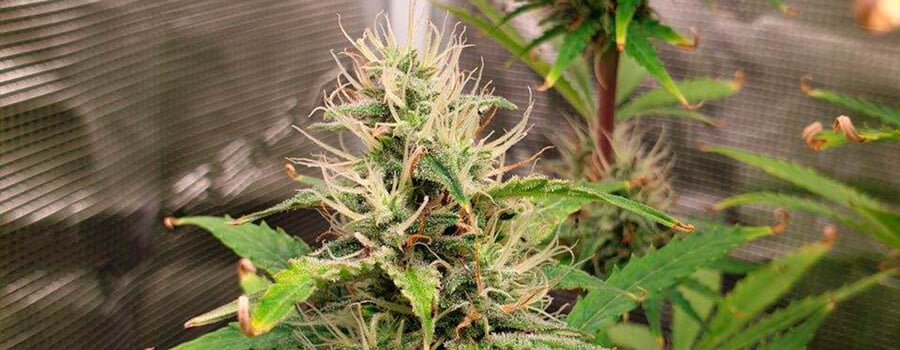
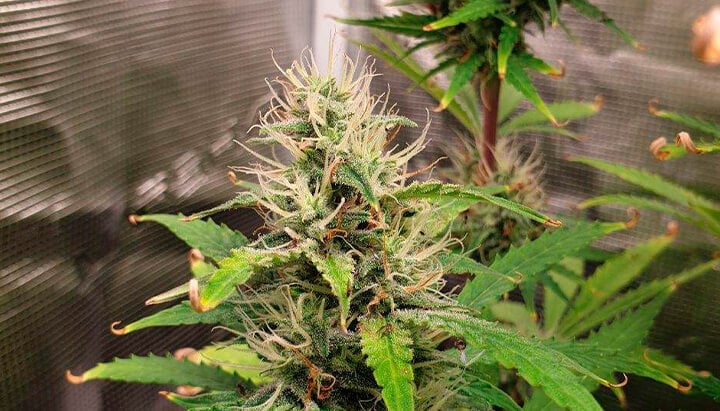
The lovechild of OG Kush and a high-performing ruderalis strain, Royal Kush Auto produces a gentle psychoactive effect ideal for beginner smokers. Sow seeds into 11-litre pots and move the containers outdoors once the risk of frost has entirely passed. Apply LST to keep plants at around 90cm, or let them surge to 150cm after stretching. During bloom, Royal Kush Auto develops buds laden with an unusual amount of sugar leaves, a trait that attracts hash makers. She’ll reach harvest after a growing cycle of 11–12 weeks and deliver a yield of 120–170g/plant. Her THC content of 13% exerts a clear-headed high perfect for any time of the day.
Royal Kush Auto
|
|
OG Kush x Ruderalis |
|
|
300 - 350 gr/m2 |
|
|
60 - 90 cm |
|
|
7 - 8 weeks |
|
|
THC: 13% |
|
|
Sativa 20% Indica 50% Ruderalis 30% |
|
|
120 - 170 gr/plant |
|
|
120 - 150 cm |
|
|
11 - 12 weeks after sprouting |
|
|
Clear, Physically Relaxing |
Purplematic
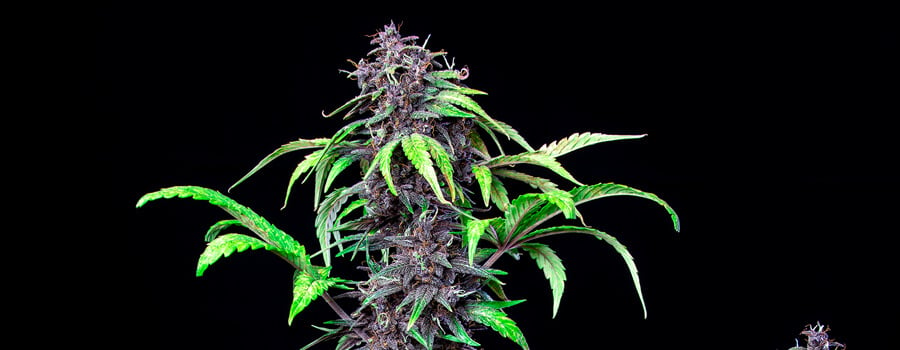
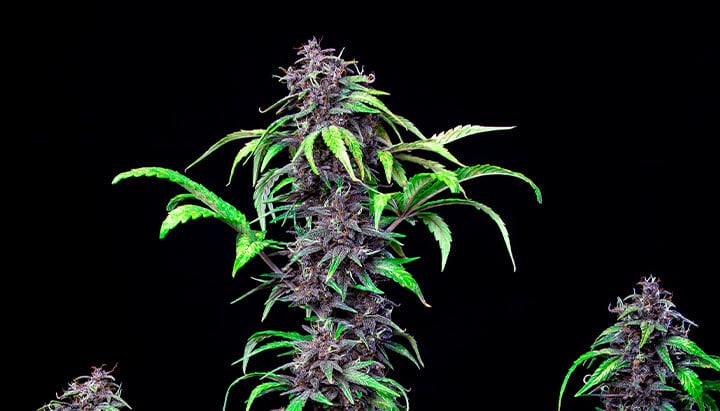
Purplematic inherited her gorgeous purple hues from parent strains Kush Rose Auto CBD and Afghan Rose Auto CBD. You can get away with sowing these seeds into their final 11-litre pots a bit later in the growing season. Use a bell cloche to protect seedlings against birds and pests. Once plants reach a height of 15cm, apply LST to create a flat and uniform canopy; this will produce a better yield. Foliar sprays of compost tea are a cheap and effective way of preventing foliage diseases. During bloom, continue to defoliate where needed to aerate the canopy. After a total growing cycle of just 8–9 weeks, get ready to process up to 150g/plant. With almost no THC and a CBD concentration of 17%, Purplematic treats users to a crystal-clear mindset without any high.
Purplematic CBD
|
|
Kush Rose Auto CBD x Afghan Rose Auto CBD |
|
|
375 - 450 gr/m2 |
|
|
70 - 120 cm |
|
|
7 - 8 weeks |
|
|
THC: 0,5% |
|
|
Sativa 5% Indica 90% Ruderalis 5% |
|
|
110 - 150 gr/plant |
|
|
100 - 140 cm |
|
|
8 - 9 weeks after sprouting |
|
|
Calming, Clear |
Punch Pie
Next up, let’s take a look at three of our latest Kush genetics. The result of a collaboration between RQS and Tyson 2.0, Punch Pie possesses some of Mike’s knockout power, imparting a euphoric high. Sow seeds directly into 15-litre pots indoors. Once sprouts emerge, move your containers into a sunny spot, using a bell cloche for protection in the early stages. This medium-sized plant will top out at 130cm at the end of veg; apply topping and LST during the third week of the growing cycle to keep plants at around 80cm instead. During bloom, untrained plants will grow to 150cm, whereas their trained counterparts will peak at 110cm. As one of the most productive Kush strains, Punch Pie will serve up 650–750g/plant in late September. Enjoy a happy, giggly, and euphoric high fuelled by THC levels of 22% and fruity and sweet terpenes.
Punch Pie
|
|
Purple Punch x Purple Kush |
|
|
550 - 600 gr/m2 |
|
|
80 - 110 cm |
|
|
7 - 9 weeks |
|
|
THC: 22% |
|
|
Sativa 10% Indica 90% |
|
|
650 - 750 gr/plant |
|
|
120 - 150 cm |
|
|
Late September |
|
|
Calming, Euphoric, Physically Relaxing, Sleepy |
Gushers
What do you get when you mix Gelato 41 with Triangle Kush? Gushers, of course! This powerhouse feminised strain has a superb germination rate, making seeds suitable for direct sowing into 15-litre pots. Move containers outdoors once plants have reached a height of 10cm and developed several sets of true leaves. Top and train during the third week of the growing cycle to produce a flat and manageable canopy. Your plant will stand at a height of around 100cm as pre-flowers start to emerge. Apply high-quality bloom nutrients during flowering to push yields to their maximum. Flush during the final two weeks of cultivation and harvest a rewarding 700g/plant in early October from specimens that stand at just 120cm. Gushers possesses a potent THC content of 24% and boasts flavours of cookies, earth, and fruit. Brace yourself for a long-lasting high that uplifts the mind while relaxing the body.
Gushers
|
|
Gelato 41 x Triangle Kush |
|
|
450 - 500 gr/m2 |
|
|
70 - 120 cm |
|
|
8 - 10 weeks |
|
|
THC: 24% |
|
|
Sativa 40% Indica 60% |
|
|
650 - 700 gr/plant |
|
|
120 - 150 cm |
|
|
Early October |
|
|
Laughter, Physically Relaxing, Uplifting |
Grape Ape Auto
If you want a taste of Kush genetics in as little time as possible, Grape Ape Auto offers a swift and reliable option. Sow seeds into their final containers and watch seedlings grow to 15cm by the end of the second week of the growing cycle. Plants will peak at 80cm by the end of veg without any training. During bloom, this strain develops large, dense, and tapered colas that emit a potent aroma of blueberry and herbs as they mature. Plants will stretch up to 120cm during flowering depending on container size. Flush during the final 1–2 weeks of the growing cycle to help her terpenes come to the fore when blazing these buds. After a total growing cycle of just 10–11 weeks, prepare to harvest 115–165g/plant. After curing, you’ll experience a focused, physically relaxing, and clear-headed effect alongside a fruity and savoury flavour profile.
Grape Ape Auto
|
|
Grape Ape x OG Kush Auto |
|
|
400 - 450 gr/m2 |
|
|
70 - 100 cm |
|
|
8 - 9 weeks |
|
|
THC: 19% |
|
|
Sativa 10% Indica 85% Ruderalis 5% |
|
|
115 - 165 gr/plant |
|
|
80 - 120 cm |
|
|
10 – 11 weeks after sprouting |
|
|
Calming, Focus , Physically Relaxing |
Welcome to the World of Kush Cannabis Genetics
Our Kush collection offers something for every grower, from those who value massive levels of THC to those who much prefer the clear-headedness of high-CBD genetics. You’ll find towering photoperiod strains that offer colossal yields alongside small and rapid autos ideal for tight spaces. So, choose the genetics that are right for you, and experience the wonder of Kush genetics during your next grow!
Categories
Strain Families






























